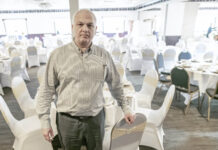When the Alpha Kappa Alpha sorority, a college-founded service organization, recently held an annual meeting in Providence, locals had only to venture downtown to know its impact.
Some 2,600 members – roughly 10 percent of AKA’s worldwide membership garnered over its century-plus existence – descended on the city in April for its 81st North Atlantic Regional Conference, staying in local hotels, dining in regional restaurants and hosting various events – some attended by the public – over four days, mostly while clad in their sorority letters and colors.
AKA officials say attendees left richer from the experience. Providence waved goodbye with something in its pocket, too: the $3 million conference-goers were expected to spend here.
“We know economically, we gave the city a boost,” said Lettita Harris, president of AKA’s Psi Omega chapter in Boston, Mass. “Cab services, restaurants, the mall … they should have seen an influx of visitors throughout our stay.”
In the most recent data available, for 2010, group meetings and conventions contributed an estimated $90 million in spending according to the Providence-Warwick Convention & Visitors Bureau.
“That’s only for groups that we’re involved with,” said Martha Sheridan, PWCVB president and CEO. There are other meetings that book directly with hotels.
The R.I. Economic Development Corporation reported last week that tourism – travel into the state for work or leisure – generates $5.2 billion in economic activity per year, while employing 41,000 people.
“The Economic Significance of Meetings to the U.S. Economy,” a study published in 2011 by the Convention Industry Council – a member organization for the meetings and events industry in Virginia – found that the industry annually contributes $263 billion in spending and is directly responsible for 1.7 million jobs nationwide.
It’s easy to understand that numbers like those are a good thing and that tourism then is vital to the nation’s economy.
But how it all boils down to better business at the storefront level isn’t always easily translated.
AKA, which brought in addition to attendees roughly 160 exhibitors, booked 3,000 nights of room stays at six hotels, including the Providence Biltmore Hotel on Dorrance Street in Providence, which benefits, like many others, from its walking-distance location to the R.I. Convention Center and other downtown attractions.
Groups also can include social functions, such as weddings. Because there are tiered rates based on factors including seasonal availability, it can be difficult to say that a single hotel made more money than they would have without them that weekend.
When AKA came into town, they took 150 rooms at the Biltmore – about half its inventory – on the busiest night.
“When there’s a big, citywide group in all the hotels, we have an opportunity to sell out and we were sold out over that weekend,” Baldwin said. “They kept our spa so busy. They were in and out of there all day long.”
The Spa at the Providence Biltmore reported that 50 percent of its weekend sales came from AKA members.
“We were thrilled to have that business, because a lot of [tourists] don’t want to go to Providence in [winter],” Baldwin said. “They say: ‘I’m going to go South Carolina or Austin.’ ”
What Providence could offer attendees was Harris’ main focus when she booked AKA here.
The group previously has convened in Boston and Connecticut and wanted a venue change.
She looked at how well the city could accommodate her groups’ specific needs and interests. The mall, she said, should have especially benefited – and it did.
“Many of my retailers said [they] wish it could be an AKA event every weekend,” said Stephanie Rice, marketing manager at Providence Place mall. “The wonderful thing for us is in the world of retail is we have our ebbs and flows and it’s just natural. In the [off season] our traffic is always fantastic because we benefit from the conventions and we don’t have those dips that a lot of other malls have.”
The mall is connected to the The Westin Providence, which sits adjacent to the convention center, generating a lot of foot traffic, especially, Rice said, when conference attendees match up with the mall’s target market – women ages 24 to 52.
It was easy, Rice added, to see how many AKA attendees visited the mall last month due to their coordinated pink-and-green outfits. Putting a tangible figure on what they spent while at the mall is a different story.
Restaurants may have an easier time identifying the dollar amounts because they deal in daily receipts and take a mix of reservations, small dinner parties and walk-in guests who they can identify as convention attendees.
Tobey Sanborn, general manager at Hemenways Restaurant on South Main Street in Providence, said his eatery took in an extra $10,000 to $15,000 during AKA’s weekend.
“[Meetings business] is highly critical. Next year, if there’s no convention in town that weekend, you’ll notice right away,” Sanborn said. “When the hotel rooms are full, we see around a 20 percent increase.”
Hemenway’s reputation and its working relationship with downtown hotels – which recommend the seafood spot to conventioneers needing a dinner suggestion – affords the ability to prepare in advance for bigger crowds.
Exact dollar figures aren’t the only way to tell business has been helped, other organizations say.
West End Community Center, a Providence social-services organization, welcomed AKA for a conference-typical, community-service project in which attendees held a youth summit on topics including healthy relationships and cyber-bullying.
“My resources are very limited, so that wouldn’t have happened if that wasn’t for the AKA sorority,” said Cheryl Isom, director of youth services. “It [was] important that we had an opportunity like [that one].”
Sakonnet Vineyards in Little Compton has about three-dozen groups visit each year and relies, General Manager Cynthia Rocha said, on word-of-mouth to bring everything from tasting outings to board receptions there.
AKA had scheduled an excursion to the vineyard but wasn’t able to garner enough interest, Rocha said.
“What [groups] allow us to do is supplement the business during nonpeak hours,” Rocha said. “We’re striving for more of that business. It’s really hard to put a [dollar figure] but I can tell you people are thinking about us in a different way. Once they come here, they [might] want to do a wedding or dinner or something like that.” •
No posts to display
Sign in
Welcome! Log into your account
Forgot your password? Get help
Privacy Policy
Password recovery
Recover your password
A password will be e-mailed to you.












